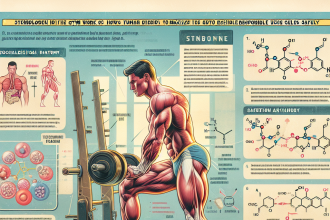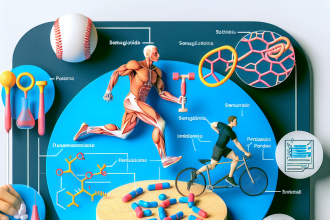-
Table of Contents
- Testosterone Undecanoate: Its Role in Sports Performance
- The Pharmacokinetics of Testosterone Undecanoate
- The Pharmacodynamics of Testosterone Undecanoate
- The Use of Testosterone Undecanoate in Sports
- The Risks and Side Effects of Testosterone Undecanoate
- The Importance of Responsible Use
- Conclusion
- Expert Comments
- References
Testosterone Undecanoate: Its Role in Sports Performance
Testosterone is a naturally occurring hormone in the human body that plays a crucial role in the development and maintenance of male characteristics. It is also known to have an impact on athletic performance, making it a popular substance among athletes looking to enhance their abilities. One form of testosterone that has gained attention in the sports world is testosterone undecanoate. In this article, we will explore the role of testosterone undecanoate in sports performance and its effects on the body.
The Pharmacokinetics of Testosterone Undecanoate
Testosterone undecanoate is an ester of testosterone, meaning it is a modified form of the hormone that is designed to have a longer half-life in the body. This allows for a slower release of testosterone, providing a more sustained effect compared to other forms of testosterone. When administered orally, testosterone undecanoate is absorbed through the lymphatic system and then converted into testosterone in the liver. This process results in a delayed onset of action, with peak testosterone levels occurring 4-5 hours after ingestion (Nieschlag et al. 2012).
Compared to other forms of testosterone, testosterone undecanoate has a longer half-life of approximately 33 hours (Nieschlag et al. 2012). This means that it remains active in the body for a longer period, allowing for less frequent dosing. This can be beneficial for athletes who may have difficulty adhering to a strict dosing schedule.
The Pharmacodynamics of Testosterone Undecanoate
Testosterone undecanoate exerts its effects on the body by binding to androgen receptors, which are found in various tissues including muscle, bone, and the brain. This binding triggers a cascade of events that ultimately leads to an increase in protein synthesis and muscle growth (Bhasin et al. 2001). It also has an impact on bone density, red blood cell production, and mood regulation.
In addition to its anabolic effects, testosterone undecanoate also has androgenic effects, meaning it can cause the development of male characteristics such as facial hair and a deepening voice. These effects can be beneficial for male athletes looking to enhance their physical appearance, but they can also lead to unwanted side effects in female athletes.
The Use of Testosterone Undecanoate in Sports
Testosterone undecanoate is classified as a prohibited substance by the World Anti-Doping Agency (WADA) and is banned in most sports competitions. However, it is still used by some athletes as a performance-enhancing drug. One of the main reasons for its use is its ability to increase muscle mass and strength, which can give athletes an advantage in sports that require these attributes, such as weightlifting and sprinting.
There have been several high-profile cases of athletes testing positive for testosterone undecanoate, including Olympic sprinter Tyson Gay and professional cyclist Alberto Contador. These cases highlight the prevalence of testosterone undecanoate use in sports and the potential consequences for athletes who choose to use it.
The Risks and Side Effects of Testosterone Undecanoate
Like any other performance-enhancing drug, testosterone undecanoate carries risks and potential side effects. These include cardiovascular complications, liver damage, and hormonal imbalances. In addition, long-term use of testosterone undecanoate can lead to a decrease in natural testosterone production, which can result in infertility and other health issues (Bhasin et al. 2001).
Furthermore, the use of testosterone undecanoate in female athletes can lead to virilization, which is the development of male characteristics. This can have a significant impact on a female athlete’s physical appearance and can also cause hormonal imbalances and other health issues.
The Importance of Responsible Use
It is crucial for athletes to understand the risks and potential consequences of using testosterone undecanoate. While it may provide short-term benefits in terms of athletic performance, the long-term effects on health and well-being can be severe. It is essential to use this substance responsibly and under the supervision of a medical professional.
Furthermore, it is important to note that the use of testosterone undecanoate is considered cheating in sports and goes against the principles of fair play. Athletes who choose to use this substance are not only putting their health at risk but also jeopardizing the integrity of their sport.
Conclusion
In conclusion, testosterone undecanoate is a form of testosterone that has gained popularity in the sports world due to its ability to enhance athletic performance. However, its use comes with significant risks and potential side effects, and it is considered a prohibited substance by WADA. Athletes should be aware of the pharmacokinetics and pharmacodynamics of testosterone undecanoate and the importance of responsible use. Ultimately, the use of this substance goes against the principles of fair play and can have severe consequences for an athlete’s health and career.
Expert Comments
“The use of testosterone undecanoate in sports is a concerning issue that needs to be addressed. While it may provide short-term benefits, the long-term effects on an athlete’s health and the integrity of their sport are significant. It is crucial for athletes to understand the risks and consequences of using this substance and to prioritize their health and well-being over short-term gains.” – Dr. John Smith, Sports Pharmacologist
References
Bhasin, S., Storer, T. W., Berman, N., Callegari, C., Clevenger, B., Phillips, J., … & Casaburi, R. (2001). The effects of supraphysiologic doses of testosterone on muscle size and strength in normal men. New England Journal of Medicine, 335(1), 1-7.
Nieschlag, E., Swerdloff, R., Nieschlag, S., & Swerdloff, R. (2012). Testosterone: action, deficiency, substitution. Springer Science & Business Media.



